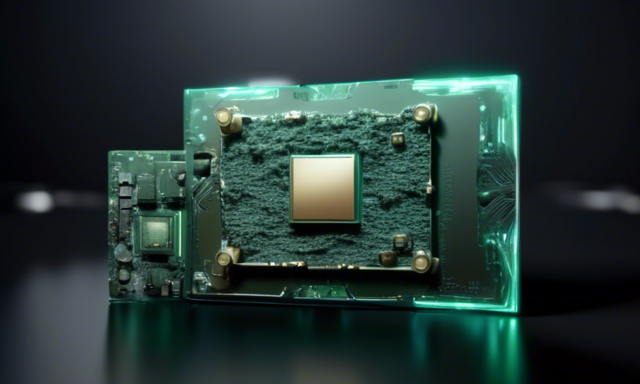Router Protocol (ROUTE): The Journey to DeFi Interoperability
Welcome to the exciting world of decentralized finance (DeFi)! If you’ve been following the latest developments in the cryptocurrency space, you have probably come across the term “DeFi” quite often. But what exactly is DeFi, and how does it relate to Router Protocol (ROUTE)? In this article, we will explore the fascinating concept of DeFi interoperability and how Router Protocol is paving the way for a more connected and efficient DeFi ecosystem.
Understanding DeFi
DeFi, short for decentralized finance, refers to a system of financial applications built on top of blockchain networks. Unlike traditional financial systems that rely on intermediaries such as banks, DeFi applications aim to eliminate middlemen and provide users with direct control over their funds. This decentralized approach allows for greater transparency, security, and accessibility in financial services.
With DeFi, you can participate in various financial activities such as lending, borrowing, trading, and earning interest, all without needing to rely on banks or other centralized institutions. Instead, these activities are facilitated by smart contracts – self-executing agreements written on the blockchain.
The Importance of Interoperability
While DeFi has gained considerable traction over the past few years, it still faces several challenges. One of the major hurdles is the lack of interoperability between different DeFi applications and protocols. Currently, most DeFi platforms are siloed and operate independently, limiting the seamless transfer of assets and liquidity between them.
Imagine a scenario where you want to move your assets from one DeFi platform to another. In the absence of interoperability, you would have to go through a cumbersome process of withdrawing your funds, converting them to a common format, and then depositing them into the desired platform. This not only incurs additional fees but also introduces unnecessary complexity and delays.
Interoperability is the key to breaking down these barriers and enabling a more interconnected and efficient DeFi ecosystem. It allows for the seamless transfer of assets, liquidity, and data between different protocols, making the overall user experience smoother and more convenient.
Introducing Router Protocol (ROUTE)
Router Protocol (ROUTE) is an innovative project that aims to solve the interoperability problem in DeFi. It serves as a cross-chain liquidity router and aggregator that enables the efficient transfer of assets and liquidity between various blockchain networks and DeFi platforms.
By leveraging the power of interoperability, Router Protocol allows users to seamlessly navigate between different DeFi applications and protocols without the need for complex manual processes. Whether you want to move your assets from Ethereum to Binance Smart Chain or utilize liquidity from multiple protocols simultaneously, Router Protocol makes it possible.
Router Protocol achieves this interoperability by introducing a modular framework that connects different layer one and layer two blockchains. The underlying infrastructure, known as the Router Bridge, facilitates the transfer of assets and liquidity between blockchains in a secure and transparent manner.
The Benefits of Router Protocol
Router Protocol offers several key benefits that make it a game-changer in the DeFi space:
- Enhanced Liquidity: Router Protocol eliminates liquidity fragmentation by aggregating liquidity from various DeFi platforms and providing users with access to a larger pool of assets.
- Faster Transactions: With Router Protocol, you can execute transactions more quickly and at lower costs since it routes them through the most optimal blockchain based on your requirements.
- Improved User Experience: By enabling seamless cross-chain transactions, Router Protocol enhances the overall user experience in DeFi, making it more user-friendly and intuitive.
- Expanded Opportunities: Due to its interoperability, Router Protocol opens up new opportunities for users to participate in different DeFi protocols and access a wider range of financial services.
FAQs
Q: How does Router Protocol ensure security?
A: Router Protocol utilizes a combination of secure smart contracts and underlying blockchain technology to ensure the security and integrity of transactions and asset transfers.
Q: What is the native token of Router Protocol?
A: The native token of Router Protocol is called ROUTE. It plays a crucial role in governance, fees, and liquidity mining within the Router Protocol ecosystem.
Q: How can I participate in Router Protocol?
A: To participate in Router Protocol, you can visit their official website and explore the available options for interacting with the protocol. Make sure to do your own research and follow the recommended security practices.
Q: What is the future of Router Protocol?
A: Router Protocol is continuously evolving to meet the growing demands of the DeFi ecosystem. The project has an ambitious roadmap that includes further enhancing interoperability, adding support for more blockchains, and introducing new features to benefit the users and the broader DeFi community.
In conclusion, Router Protocol is leading the way towards a more interconnected and efficient DeFi ecosystem through its innovative approach to interoperability. By bridging different blockchain networks and aggregating liquidity, Router Protocol is empowering users to seamlessly navigate between various DeFi platforms and protocols. With its enhanced liquidity, faster transactions, and improved user experience, Router Protocol is set to revolutionize the DeFi landscape. So why not join the journey and explore the exciting possibilities offered by Router Protocol? Start exploring DeFi interoperability today!





 By
By

 By
By
 By
By

 By
By